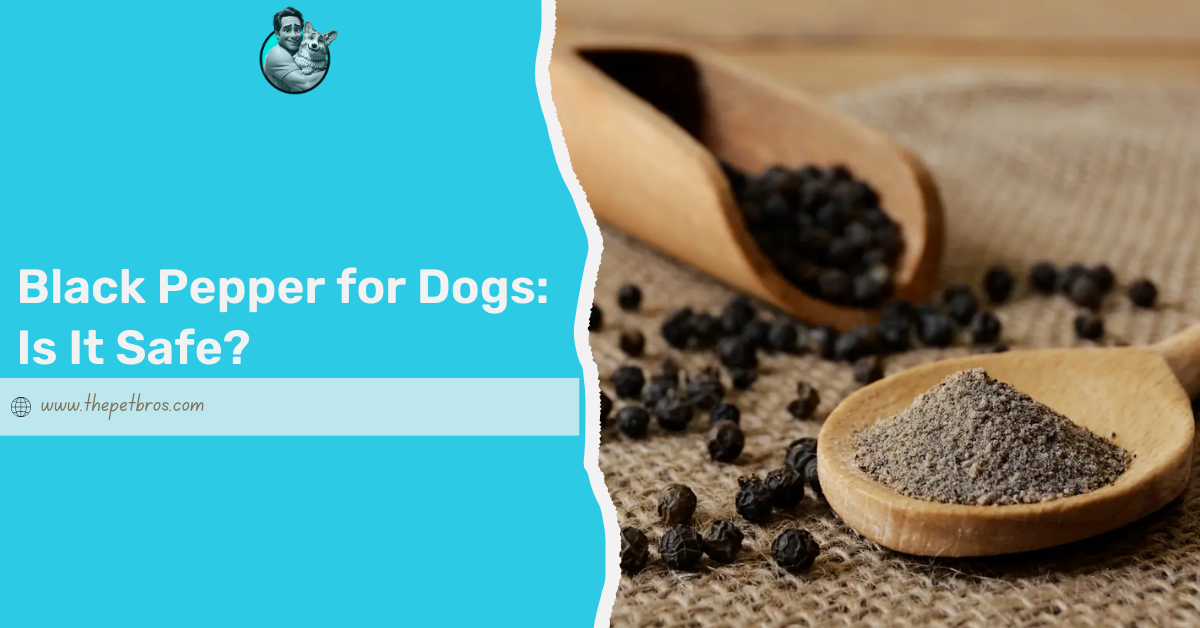Your dog will eat anything. Socks, sticks, your last slice of toast, it’s all fair game. But the moment they sniff a speck of spice, things get interesting. If you’ve ever caught your pup sneezing like they’re fighting off a pepper ghost, you’ve probably wondered about black pepper for dogs.
Black pepper is one of the most common household spices. We sprinkle it on almost everything, from eggs to grilled chicken, without a second thought. But just because it’s harmless to us doesn’t mean your dog’s stomach or nose is on board. Dogs experience spices differently, and their bodies are much more sensitive to even the tiniest ingredients we take for granted.
It may seem harmless, especially when it’s just a sprinkle on your dinner. But when it comes to our four-legged foodies, not everything that tastes good to us sits well with them. Before you let those peppery leftovers hit the floor, there are a few things you should know.
First, Can Dogs Eat Black Pepper?
Let’s get one thing out of the way. Your dog is not a picky eater. If it smells remotely edible, it’s probably already halfway down their throat. But when it comes to spices like black pepper, things get a little less straightforward. So, can dogs eat black pepper? The short answer is yes, they can, but only in the tiniest of amounts.
Black pepper is not toxic to dogs, which is good news if yours happens to hoover up a stray crumb or two from your dinner plate. But just because it isn’t poisonous doesn’t mean it belongs anywhere near your dog’s dinner bowl. Unlike humans, dogs have very sensitive noses and digestive systems. A few specks of pepper might not seem like much to you, but for your pooch, it can be quite overwhelming.
The truth is, black pepper for dogs offers no real benefit. It doesn’t add any flavour they enjoy, and it’s not something their body needs. Most pups turn their noses up at the stuff. Some will even sneeze dramatically if they get too close to it. You might find it funny, but their little sneezes are a sign that their body is irritated.
So, if you’ve accidentally dropped a bit of peppery food on the floor of your house, and your dog snatched it up, don’t panic. Just watch them for a while and make sure they’re acting normal. But as a rule, it’s best to keep black pepper off the menu when it comes to your dog’s meals. They’ll thank you in their own slobbery way.
What Are the Benefits Of Black Pepper For Dogs?
Now, you might be wondering if there’s any good reason to let your dog near black pepper at all. After all, we often hear about spices having health benefits for humans, so could it be the same for our furry friends? Well, black pepper for dogs is a bit of a mixed bag.
On its own, black pepper doesn’t do much for dogs. It’s not harmful in tiny amounts, but it’s not useful either. Most pups will wrinkle their nose at the smell and walk away, and that’s probably for the best. But there’s one exception to this rule, and that’s when black pepper is used in combination with turmeric.
You see, black pepper contains a compound called piperine. It sounds fancy, but what it really does is help the body absorb another compound called curcumin, which is found in turmeric. Curcumin is known for its anti-inflammatory effects, and in certain vet-approved supplements, it’s used to support dogs with stiff joints or general inflammation.
So, black pepper has a small part to play, but only when carefully measured and mixed into professional supplements like Relief Chews. You should never try to create your own peppery mixture at home. Always check with your vet before giving any new product to your dog, especially when spices are involved. When it comes to their health, a little guidance goes a long way.
What Happens If Your Dog Eats Too Much Black Pepper?
Let’s say your dog has just helped themselves to your leftover dinner, and it was seasoned with a bit too much pepper. The good news is that black pepper for dogs isn’t toxic in the same way as chocolate or grapes are. Still, it’s far from harmless if they’ve eaten a fair bit.
One of the first things you might notice is sneezing. Lots of sneezing. Black pepper is known to irritate the nose, and dogs are especially sensitive to smells. Their sniffers are incredibly powerful, and even a small amount of pepper can send them into a sneezing fit that looks dramatic but is usually their way of clearing things out.
Next comes the possibility of an upset stomach. If your dog has had more than just a few crumbs, you might see symptoms like loose stools or even a bit of vomiting. It’s their body’s way of saying, “No thank you” to whatever spicy adventure they’ve just had. Not every dog reacts this way, but those with more sensitive tummies are more likely to show signs.
In rare cases, black pepper can do more than just cause a mild reaction. Too much could lead to ongoing diarrhoea, drooling, or even respiratory irritation. If your dog starts acting unusually quiet, struggles with breathing, or keeps pawing at their face, it might be time to pick up the phone and speak to your vet.
As always, a bit of observation goes a long way. Keep them comfortable, make sure they’re drinking water, get enough rest, and monitor them for the next day or so. If they’re back to their playful self in no time, great. If not, don’t wait around. Getting a vet’s opinion will always be the safest move.
Conclusion
So, while black pepper for dogs might not be a total disaster in tiny amounts, it’s definitely not something to sprinkle into their supper on purpose. A curious lick won’t do much harm, but regular seasoning is a no-go. Keep their meals simple, safe, and spice-free. For more tips on keeping your cheeky pup happy, healthy, and out of your spice rack, stick around, we’ve got loads more coming your way.
FAQs
What happens if a dog eats a little bit of black pepper?
They might sneeze or feel a bit off, but it’s usually harmless.
How much black pepper is too much for a dog?
More than a light sprinkle can cause digestive trouble or discomfort.
What pepper is safe for dogs?
Bell peppers are safe and even nutritious. Avoid anything spicy.
Can dogs eat black pepper?
Yes, but only in tiny amounts and never on purpose.
Is black pepper toxic to dogs?
Not toxic, but it can cause irritation and digestive upset in large quantities.














